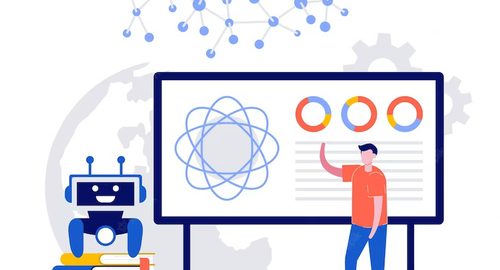The e-learning industry is one of the most rapidly evolving fields. According to Statista, in 2019, the global e-learning market was valued at $200 billion and is expected to cross $400 billion by 2026.

With the growing market size, it is imperative that organizations explore new technologies that can enhance the e-learning experience. One such technology, which has tremendous potential, is artificial intelligence or AI.
AI-driven applications are enabling students to learn faster and more effectively while also giving teachers access to powerful tools that can help them tailor their lessons for maximum impact. Studies show that in 2022, the market value of AI in the e-learning industry was $4 billion and is projected to reach $30 billion by 2032.
In this article, we will look into how leveraging artificial intelligence can enhance the learning experience for learners.
Impact of AI on Elearning Experience
-
Personalization of Learning
Everyone learns differently, and the traditional one-size-fits-all teaching approach fails to keep up with individual learning needs.
AI-driven applications can help customize the learning experience by analyzing data from the user’s learning journey to create personalized experiences. The AI algorithm can track the progress of each student through the course and identify the knowledge gap.
Based on this data, the algorithm can recommend learning paths and resources that better cater to the learners’ individual needs. This process is called adaptive learning. By providing a customized learning experience, AI can help students stay motivated, engaged, progress at their own pace, and get a better understanding of the subject.
-
Faster Content Creation
Creating e-learning courses is a time-consuming task that can take several weeks to complete. AI-powered tools can help speed up the content creation process with the help of language modeling that can analyze data from existing content, such as textbooks or legacy courses, to recommend new topics. This reduces the time-to-market, as the instructors don’t have to start from scratch.
Another benefit of leveraging AI in e-learning is that it can be used to translate content into other languages or localize your existing courses so that you can reach new audiences from around the globe.
It can also enrich the learning experience by providing innovative ways of presenting information, such as visualization, simulation, and web-based studies.
-
Virtual Assistants
It is difficult for instructors to constantly monitor each learner and provide them with timely guidance. AI-powered virtual assistants such as chatbots can help answer common questions from learners, provide real-time feedback on assignments, and answer questions related to the course material.
These virtual assistants can also connect learners with instructors if the query is complex. This means that students can receive help for common queries outside of traditional teaching hours, and teachers can focus on resolving complex doubts only.
-
Automated Grading
A major part of any e-learning course is assessments, and grading them can be a tedious task. Manually evaluating assignments and tests is laborious, time-consuming, and prone to human errors.
AI-driven tools help automate the process by leveraging natural language processing (NLP) to assess long answers in written form. This speeds up the assessment process as instructors do not have to manually grade each answer. Even if there are subjective questions, AI algorithms can judge based on keywords and patterns that they identify from the answer provided.
Automated tools can also grade students’ assignments in real-time and provide instant actionable insights about their performance. This helps learners gain a better understanding of their strengths and weaknesses, which gives them an opportunity to improve quickly.
Furthermore, these tools can also check answers for plagiarism and detect similarities between learners’ submitted assignments.
-
Gamification
Gamification involves the integration of game mechanics into the learning process. It can make learning more engaging, fun, and interactive, which can improve knowledge retention. AI can enhance gamification by analyzing student performance and adapting the game’s difficulty to match the student’s ability. AI can also provide personalized feedback and rewards to motivate students and enhance the learning experience.
-
Content Analytics
Instructors need to track the performance of students and identify areas of improvement. AI-driven analytics tools can help instructors analyze data such as engagement with content, time spent in completing tasks, or the number of attempts made for an assignment. This allows instructors to determine which topics are challenging for learners and fine-tune their strategies accordingly.
AI also helps instructors measure the effectiveness of their teaching strategy by understanding learner behaviors and preferences. Such data points can help improve the learning outputs and student satisfaction levels.
-
Easy Access for Students With Special Needs
AI-driven technologies allow instructors to customize the learning experience based on students’ disabilities and special needs. This helps make e-learning accessible to all, regardless of their physical or mental abilities. AI tools can also recognize and respond to non-verbal communication signals such as facial expressions, behavior, eye movements, gestures, etc., that enables convenient access and a better learning experience for learners with communication impairments.
Conclusion
AI has immense potential to transform the e-learning industry. With the help of AI-driven tools, e-learning can be personalized and automated to offer a superior learning experience. It can also enhance accessibility to education by providing learners with disabilities a way to access online resources. With the right strategies and implementations, AI can help make learning more effective and efficient.
If you are looking to integrate AI into your e-learning processes, Mindfire Solutions is here to assist you.
Mindfire Solutions is a leader in providing AI-driven solutions for the ELearning industry. With our expertise in machine learning and natural language processing, we can help transform e-learning systems into smarter, more efficient learning platforms.
Visit Mindfire Solutions to learn more about our strengths and capabilities.
No comments:
Post a Comment